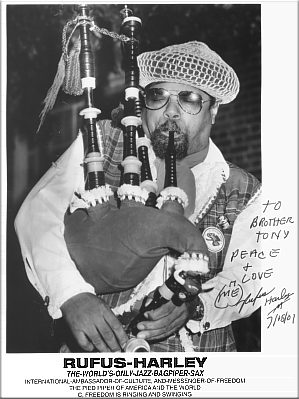Rufus Harley
 |
Between the easy melodic and the grating avant-garde, the funky-hip and the noodly-progressive, the workaday and the Saturnistic, slip unnoticed the "other" greats of jazz. These are not the Armstrongs or Ellingtons --darlings of the PBS set-- but the heros who have working, club DJs excited today. Along with Sabu Martinez, Dorothy Ashby, and Dave Pike, one such standout is Rufus Harley. Uniquely even in this illustrious company, Rufus remains the only practitioner of his instrument, jazz bagpipes. The first Rufus Harley record astounded the jazz world, instantly dividing all comers into either the insecurely square, who greeted it as likely a novelty or put-on, or the truly hip, who smiled at both the idea and the sound. If fellow Philadelphian Sun Ra could play the cosmic Batman, certainly a sax player should have developed the jazz potential of the pipes. Understandably, the first Rufus Harley record divided jazz fans into two camps: the insecurely square, who greeted it as a novelty or put-on, and the truly hip, who smiled at both the idea and the sound. If fellow Philadelphian Sun Ra could play the cosmic Batman, certainly a soul-jazz sax player could discover the jazz potential of the pipes. And how. The Rufus Harley story, with its peaks and valleys and belated comebacks, is not atypical of the jazz greats. What is unique are the man and his music. His inspiration could not have been nobler: viewing on television and being moved by the pipes of the Black Watch Scottish Marching Band, who were playing for the funeral of slain President John F. Kennedy in November, 1963. With a $120 set of pipes from a pawn shop and help from musician-teacher Dennis Sandole, the world's only jazz bagpipist was on his way. Scarcely more than a year later his first album was released to acclaim and even rabid boosterism by radio jocks. Born May 20, 1936 in Raleigh, North Carolina, Harley had been playing various saxophones and winds since high school in Philadelphia. He credited Sandole with his early development and encouragement. Serious lessons and intensive practicing began in 1960, and both men kicked into high gear when the bagpipes inevitably became Harley's signature instrument. Scotch & Soul stands as the early masterpiece, the title track being an original soul-jazz boogaloo. Here one can savor the "scotch," or Harley's mastery of the only wind instrument capable of sustained notes and simultaneous drones. And while you and Harley are enjoying his notes, which once blown can take care of themselves for awhile (such is the nature of the pipes), the rest of the band catches up and cooks along with the "soul." What would have been a heavy sax classic, on bagpipes stands as completely beyond the wildest dreams of both jazz fans and pipers in ancient Egypt, Africa, India, Rome, Portugal, and eventually the Scottish highlands. Other highlights of his Atlantic records include his own bagpipe tribute to Kennedy and recording with percussionists Montego Joe and Nadi Qamar (African thumb piano). He joined Roy Ayers on Herbie Mann's "Flute Bag," and on the Fantasy/Milestone label Sonny Rollins featured him on "Swing Low." But Rufus Harley records did not stop there. His own, later productions are even more amazing! 1972's Re-Creation of the Gods, a heavy bagpipe-funk LP produced by Harley himself, became the legendary rarity. "Malika" is the DJ cut. Since the late 1980s Harley has toured worldwide and recorded CDs of both live and studio material. His innovation and skill, not to mention the support of his fellow band members including son Messiah on trumpet, continued to grow until his death in July, 2006. To the list of his unique accomplishments, add electrified bagpipes and even reggae pipes. The personal side of the man is as endearing and warm as can be. Just as his music is always ahead, forever leading as the Pied Piper of Jazz will, Rufus Harley took his role of spreading peace and love seriously. He wrote politicians about the evils of handguns, drugs, and meat consumption (how now, mad cow). He adopted Philadelphia's landmark Liberty Bell as one of his personal logos. But while the bell's days of being sounded are long past, Harley believed his --and bagpipes'-- time is now. In addition to his stints with legends of jazz, Harley once gave a bagpipe lesson to Muhammed Ali (there is a photo), and he appeared on fellow Philadelphian Bill Cosby's "The Cosby Show." Television talk-show and game-show appearances include Mike Wallace, Joan Rivers, "What's My Line," and "To Tell the Truth." This despite continuing to work for the Philadelphia Housing Authority while most of the jazz world scratched its head. The spiritual and mystical informed his life and speech as much as his music. He believed "what goes around comes around." Original "Pied Piper" and space cartoons, photos with other jazz greats, and symbols of the Cherokee Nation (his father was Cherokee) and Scottish groups tell us where he has come and gone. And they remind us of universal higher callings and roots. It is all the real deal. Child of the Universe and authentic True Believer from the era of groovy soul, Rufus Harley borrowed back the Scots' adopted national instrument and shared it anew with the funky world from which it came, long ago. Buying: Yes, always. All of them. Right now. |
Rufus Harley LPs
| Rating | |
| 8 | Bagpipe Blues; Atlantic SD-3001; 1966/1965 (Bagpipe Blues, Kerry Dancers, Who Can I Turn To [When Nobody Needs Me], More, Chim Chim Cheree, Sportin', Sometimes I Feel Like a Motherless Child) |
| 9 | Scotch & Soul; Atlantic SD-3006; 1967/1966 (Feeling Good, If You Could See Me Now, Taurus the 20th, Scotch & Soul, Passing the Cup Around, A Nightingale Sang in Berkeley Square, Sufur) |
| 8 | A Tribute to Courage; Atlantic SD-1504; 1968 (Sunny, A Tribute to Courage [JFK], Swing Low Sweet Chariot, Ali, "X", About Trane) |
| 8 | King/Queens; Atlantic SD-1539; 1970 (Eight Miles High, Moon River, Love is Blue, Windy, King, Queens) |
| 9 | Re-Creation of the Gods; Ankh; 1972 |
| 8 | Harley's Comet (possibly only on cassette; C-melody sax only) |
Partly Rufus Harley LPs
| Rating | |
| 7 | Laurie Anderson: Big Science--Songs from United States I-IV; Warner Bros. BSK-3674; 1982 ("Sweaters") |
| 6 | Herbie Mann: The Wailing Dervishes; Atlantic SD-1497; 1967 ("Flute Bag") |
| 7 | Sonny Rollins: The Cutting Edge; Fantasy/Milestone 9059; 1974 ("Swing Low") |
| The Roots: Do You Want More?!!!??!; 1994 ("Do You Want More?!!!??!") | |
| 7 | Sonny Stitt: Deuces Wild; Atlantic SD-3008; 1967 ("Pipin' the Blues") |
Rufus Harley 45s
| Rating | |
| 7 | Bagpipe Blues/Chim Chim Cheree; Atlantic 45-5085; 1965 |
Rufus Harley CDs
| Rating | |
| 9 | The Pied Piper of Jazz; Label M 5710; 2000 (compilation of Atlantic cuts, 1965-70) |
| 8 | Live in Bethune, Beunry, France (Bagpipes of the World) |
| 9 | Rufus Harley w/Georges Arvanitas Trio: From Philadelphia to Paris; Carrere 96.632; 1997/1988 (Scotland the Brave, Me to Me, Greensleeves, Sem La, Oui Free, Homecoming, Moon River, The Monkey Driver, Amazing Grace, Nancy with the Laughing Face) |
| 9 | Brotherly Love; Tartan Pride CD-9801; 1998 (Brotherly Love, Auld Lang Syne, Scotland the Brave, Jesus Loves Me, Melancholy Baby, Stormy Weather, A Love Supreme) |
| 8 | Live & Direct in Jamaica--Bagpipe Ruled Jazz Summit; 2001 (live; America & Jamaica, Someday My Prince Will Come, Kingston, Montego Bay, Amazing Grace, Scotland the Brave, Sunny Moon for Two--A Tribute to Sonny Rollins, A Child is Born, Medley: Hava Nagila, Beethoven's 9th, We Shall Overcome, My Country 't'is of Thee, Solo Bagpipes) |
Hyp Records is a 3-part guide: |
Shop Hip WaxSome items above may be available at Hip Wax Hip Wax |
Hyp Records Guide © 1996 Hip Wax